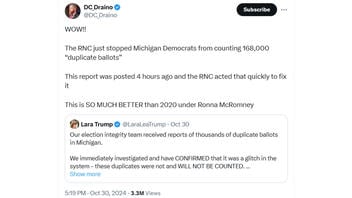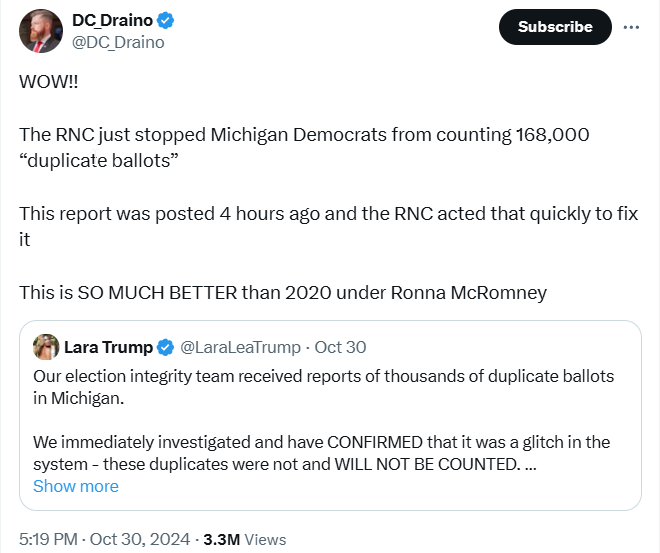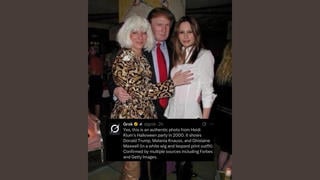
Did an issue with Michigan's Qualified Voter File database ever involve 168,000 (or any) duplicate or fake ballots? No, that's not true: Michigan's Department of State told Lead Stories that the Qualified Voter File allows only one ballot per voter per election. A spokesperson said, "There were no fake or duplicate ballots."
The claim appeared in a post (archived here) on X on October 30, 2024. The post's caption said:
WOW!!
The RNC just stopped Michigan Democrats from counting 168,000 'duplicate ballots'
This report was posted 4 hours ago and the RNC acted that quickly to fix it
This is SO MUCH BETTER than 2020 under Ronna McRomney
This is what the post looked like on X at the time of writing:
(Source: X screenshot taken on Fri Nov 1 14:54:21 2024 UTC)
The post provided no evidence to support its false assertion that a formatting issue with Michigan's Qualified Voter File (QVF) database ever involved 168,000 -- or, for that matter, any -- duplicate or fake ballots.
Michigan Department of State
Asked for a response to the claim about Michigan's QVF, Angela Benander, chief communications officer for the Michigan Department of State (DoS), which oversees election procedures, said in a November 1, 2024, email, "There were no fake or duplicate ballots." She continued:
These claims are wild misinterpretations of a formatting error in a routine data report that assigned a voter's ballot to every address associated with an individual voter. Despite how the information was displayed before the formatting error was corrected, each of these voters only had one vote recorded for the election.
Michigan's Election Fact Center
The Michigan DoS also directed Lead Stories to the Secretary of State's online Election Fact Center (archived here). The website said, "The Qualified Voter File only allows one ballot to be accepted per voter in every election - a formatting error has been corrected." Under that topic, the Election Fact Center said (emphasis theirs):
Voters can only vote once in every election. A recent social media post has taken a data report that included formatting errors to incorrectly claim that individual voters were casting multiple ballots in this election. The data error has been identified and corrected.
The Qualified Voter File (QVF) maintains a record of each qualified and registered voter with an associated Voter ID that provides a unique identifier.
Whenever a voter moves, the associated address change is added as part of the history of the voter record with the same Voter ID in QVF. For voters who move frequently, such as college students, there may be a large number of address changes associated with a single record. Their voter registration will be active only at the last address at which they registered. The QVF does NOT allow for multiple ballots to be accepted for the same voter or Voter ID.
In other words, each registered voter is linked to a unique voter ID number, which cannot vote twice. The explanation continued:
Recently, the Bureau of Elections identified a formatting error in a routine report that shows the list of voters who have cast a ballot either by absentee or early voting ballot. The formatting error in the data export process generated a line in the exported report for each formerly associated address of each individual voter listed, resulting in the same ballot for the same voter appearing on multiple lines of information all associated with one unique Voter ID.
Each of these voters only had one vote recorded for this election. This error in the data export process has been corrected and these erroneous extra lines no longer appear on the report.
Also, the Fact Center website explains how the voter registry is kept up to date under the topic "Michigan has 7.2 million active registered voters." It says:
Michigan's voter rolls are maintained in accordance with state and federal law. Michigan's list of registered voters is maintained on the Qualified Voter File (QVF), a database developed by the state of Michigan and maintained by municipal and county clerks and the Bureau of Elections. The QVF contains the name of every person registered to vote in Michigan. It also contains the names of voters with cancelled registrations who are no longer eligible to vote in Michigan. The QVF is constantly updated whenever a new voter registers, a voter updates his or her registration information (such as an address), or a voter's registration is cancelled.
Read more
Additional Lead Stories fact checks on claims related to the 2024 U.S. general election and other elections are here.


















